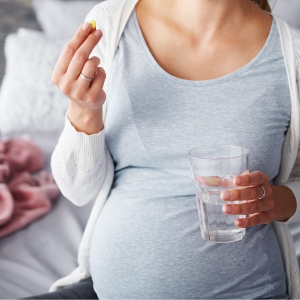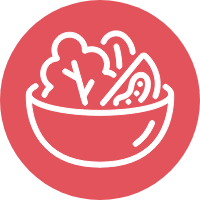- HealthBites for Diabetes Resource Hub
- Calcium: An Essential Nutrient For Your Bone Health
- How To Manage Your Cholesterol Levels
- How To Prevent And Treat Constipation
- How To Manage Your Diet and Health When You Have Diabetes
- How To Manage Diarrhea
- High Blood Pressure and Food Choices
- Everything You Need To Know About Probiotics
- What You Need To Know About Vitamin B12
- How To Manage Gas and Bloating
- Heartburn Relief
- Solutions To Manage Dry Mouth
- Celiac Disease: Gluten-Free Diet
- Osteoporosis Prevention: Keeping Your Bones Healthy
- The Importance of Vitamin C
- What You Need to Know About Folate
- What You Need To Know About Iron
- What You Need To Know About Potassium
- What You Need To Know About Magnesium
- What You Need To Know About Zinc
- What You Need To Know About Vitamin K
- All About Vitamin D
What You Need to Know About Folate

Folate, also known as folic acid (vitamin B9), is a water-soluble b-complex vitamin that helps with cell growth and maintenance. Folate cannot be stored in your body. A sufficient folate intake is particularly important for pregnant women and women who wish to become pregnant.
Folic Acid for Pregnancy
Folic acid is the form of folate found in vitamin supplements. Pregnant women require a folic acid supplement for the proper development of the baby's brain, skull and spinal cord and to prevent some birth defects, especially during the first four weeks of pregnancy. It is recommend that all women who could become pregnant, are planning a pregnancy or are pregnant take a daily folic acid supplement.
An adequate intake of folic acid is essential for all women during pregnancy to reduce the risk of a baby being born with a neural tube defect (NTD). The neural tube is the part of the developing baby that becomes the brain and spinal cord. A NTD occurs when the neural tube does not fully close.
Folic Acid Supplementation
Although folate can be found in many foods when eating a healthy well-balanced diet, dietary sources alone are not enough to reach the required folic acid level to protect against NTDs. Therefore, it is recommended that women take 0.4 mg of folic acid daily starting three months before getting pregnant, throughout their pregnancy and until four to six weeks postpartum or for the duration of breastfeeding. Future mothers are also strongly encouraged to maintain a folate-rich diet.
Speak to your healthcare professional to determine the right dose of folic acid to take and multivitamin product recommendations that contain enough folic acid to meet your needs.

Folate Food Sources
Folate is found in a variety of healthy foods such as enriched grain products, cooked dried peas, beans, and lentils as well as many vegetables like spinach, broccoli and asparagus.
See the table below for a list of common food sources.
| Food Group | Food | Serving size | Folate (mcg) |
|---|---|---|---|
| Vegetables and Fruit | |||
| Spinach, cooked | 250 mL (1 cup) | 278 | |
| Kale, raw | 250 mL (1 cup) | 100 | |
| Broccoli, cooked | 125 mL (½ cup) | 89 | |
| Asparagus, cooked | 4 spears | 88 | |
| Brussels sprouts, frozen, cooked | 4 sprouts | 85 | |
| Avocado | ½ fruit | 81 | |
| Lettuce, romaine or mesclun | 250 mL (1 cup) | 73 | |
| Beets, cooked | 125 mL (½ cup) | 72 | |
| Spinach, raw | 250 mL (1 cup) | 61 | |
| Papaya | ½ fruit | 56 | |
| Potato, with skin, baked | 1 medium | 48 | |
| Cantaloupe | 250 mL (1 cup) | 36 | |
| Orange | medium | 26 | |
| Grain Products | |||
| Pasta, egg noodles, enriched, cooked | 125 mL (½ cup) | 138 | |
| Pasta, spaghetti, white, enriched, cooked | 125 mL (½ cup) | 88 | |
| Cracker, saltine | 10 crackers | 65 | |
| Bread, white | 1 slice (35 g) | 62 | |
| Bagel plain | ½ bagel (44.5 g) | 14 | |
| Bread, whole wheat | 1 slice (35 g) | 11 | |
| Milk and Alternatives | This food group contains very little of this nutrient | ||
| Meat and Alternatives | |||
| Liver (turkey, chicken), cooked* | 75 g (2.5 oz) | 469 | |
| Liver (beef, pork), cooked* | 75 g (2.5 oz) | 158 | |
| Non-Meat Sources | |||
| Lentils, cooked | 175 mL (¾ cup) | 265 | |
| Peas (chickpeas/garbanzo, black-eyed/cowpeas, adzuki), cooked | 175 mL (¾ cup) | 221 | |
| Beans (navy, black, small white), cooked | 175 mL (¾ cup) | 186 | |
| Edamame/baby soybeans, cooked | 125 mL (½ cup) | 181 | |
| Peas, pigeon, cooked | 175 mL (¾ cup) | 138 | |
| Sunflower seeds, without shell | 60 mL (¼ cup) | 79 | |
| Soybeans, dry, roasted | 60 mL (¼ cup) | 89 | |
*Pregnant women should limit intake of liver to one serving every two weeks
The information in this resource is for general information purposes only and is not intended to replace informed medical advice. Consume foods according to any dietary guidelines you have been provided from a health care professional. Metro Ontario Pharmacies Limited assumes no legal liability for the accuracy, completeness or usefulness of the information.












